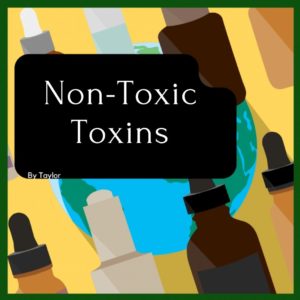December 16th, 2022
Are cosmetic labels lying to you?
Our generation clearly has concern for the well being of ourselves and the environment that influences our everyday choices and routines. A study from 2021 found that, “for younger generations, the biggest consideration when shopping for beauty products was natural, non-toxic ingredients” (Klarna, 1). But are these efforts for a clean beauty routine effective? There are lots of loose terms and misinformative studies that make it hard to figure out what’s truly good for the environment and skin.
Natural beauty
Firstly, what does the “natural, non-toxic” beauty product we’re aiming for look like? It turns out, these labels don’t tell us much. Natural means that ingredients in the product are obtained from nature, but the word is often accompanied by qualifying words like naturally-occurring or naturally-derived which change the meaning (the latter means the natural ingredients are processed, refined, or altered before the product is finished). The label Natural doesn’t even confirm the environmental friendliness of products as it doesn’t reveal whether or not pesticides or destroyed habitat land was used to cultivate ingredients. Non-toxic, used interchangeably with the label Clean, is even more ambiguous. While the two are connected with the absence of harmful chemicals and ingredients found in cosmetic products, the practically non-existent regulations on these terms result in the terms holding very little informative value. Misleading and unregulated terms like natural or non-toxic make shopping for new cosmetics hard, so ensure you know the meaning of product labels before purchasing.
Labels
There are some more precise and reliable labels that can be used to avoid ingredients that aren’t as health and environmentally sound, like paraben-free. Parabens have been used in beauty products for years as a preservative to prolong the shelf life of lotions, soaps, and other products. There have recently been some studies that point to parabens having some negative effects on health, although there have not been any drastic conclusions scientists have drawn. What can be agreed upon is that parabens are found in the water, dust and air discharged from manufacturing locations and making their way into marine animal tissues. Paraben-free ensures that the product has no parabens in the ingredients to potentially affect your health or the environment.
It is difficult to tell whether or not cosmetics are truly good for both the environment and skin, even with proper labelling. While it’s good to be knowledgeable on the topic, the best choice to ensure skin health when choosing cosmetic products is to speak with a dermatologist or other health professional, especially if there are concerns regarding sensitivity or other skin issues. Individual choices regarding skin care are also not the cause of climate change, and have virtually no impact on the environment when compared to the bigger picture of large corporations and factory emissions. Nevertheless, the prioritisation of health and the environment by young generations proves that the world is becoming rich in knowledge and resources for years to come.
By Taylor Murphy
Categories: Editorials

